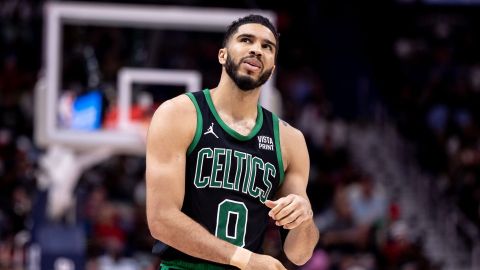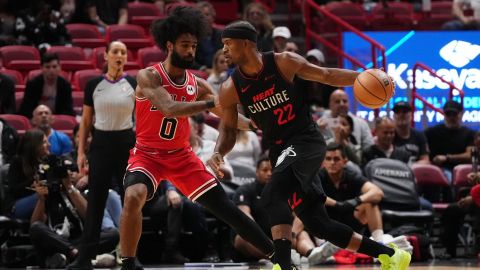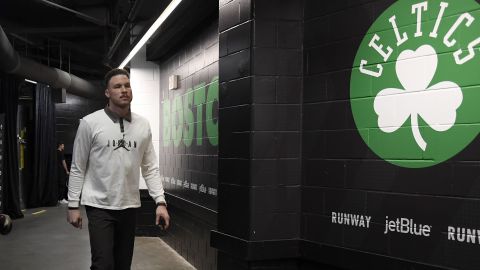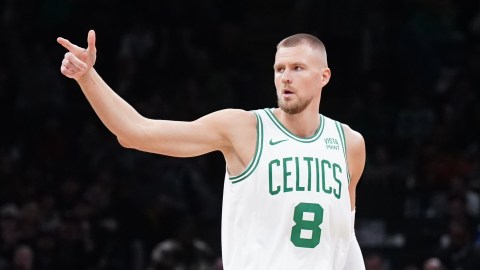 Danny Ainge is a busy man and a miracle worker, if every trade rumor involving the Boston Celtics is to be believed. Not only is Ainge selling off every asset on Boston’s roster to at least a dozen teams, but he’s also simultaneously adding pieces to compete for a championship as soon as next season.
Danny Ainge is a busy man and a miracle worker, if every trade rumor involving the Boston Celtics is to be believed. Not only is Ainge selling off every asset on Boston’s roster to at least a dozen teams, but he’s also simultaneously adding pieces to compete for a championship as soon as next season.
We’ve seen Ainge pull off some impressive moves in the past, but we didn’t know he also was able to bend the laws of reality.
In fairness, the Celtics’ president of basketball operations could go a multitude of ways with Thursday’s NBA trade deadline looming. Those actions — or lack thereof — would not definitively signal Ainge’s long-term plan, but they would offer hints as to which way he’s heading with his latest rebuild.
With that in mind, here is a sample of possibilities for Ainge at the deadline, in decreasing order of likelihood, and what each could mean moving forward.
Celtics make some minor, cost-cutting moves.
What they’d do: Currently less than a million dollars below the luxury tax line, the Celtics could protect themselves from future high tax payments by shedding a bit more payroll now. A good example of this sort of deal would be what happened in training camp, when the Celtics traded Fab Melo to the Memphis Grizzlies for Donte Greene and subsequently waived Greene to get below the luxury tax line. In other words, don’t expect the Celtics to just release Gerald Wallace. It wouldn’t help, anyway.
What it would mean: While the Celtics’ owners have never been afraid to pay the tax as a price for championship contention, nobody wants to pay the tax to be average. That’s especially true with a harsh “repeater” tax due to take effect next season. If the Celtics are in tax territory this year, they would be hit with the extra dollar-per-dollar tax next year. They’re not on pace for that now, but it never hurts to be safe in case injuries force them to sign a stopgap player or two.
Celtics further dismantle their young veteran core.
What they’d do: Brandon Bass has enough value at a respectable, $6.5 million price point. Some general manager or coach might believe he can figure out Jeff Green. Avery Bradley already turned down a contract extension offer from the Celtics, muddying his future in Boston. Basically, anyone who is not an All-Star or is not on a rookie contract bids adieu.
What it would mean: To varying degrees, moving these players could bring back worthwhile future assets or provide payroll relief for the Celtics, but they also could put the team another year or two farther away from contention. The Celtics would keep young pieces like Jared Sullinger and Kelly Olynyk, and potentially Rajon Rondo as well, to reset the rest of the roster. This would leave open the possibility of a busy summer, since the Celtics would retain their most valuable trade chips.
Celtics stand pat.
What they’d do: If Ainge trusts the work he’s done already, he might be content to sit back and watch the sparks fly throughout the rest of the league at the deadline. He could simply wait for Kris Humphries ($12 million), Jerryd Bayless ($3.1 million) and Bradley ($2.5 million) to come off the books on July 1. As it is, the Celtics appear to be neither too good to avoid the draft lottery nor too awful to be completely hopeless moving forward. Patience is not always the worst thing; the early bird gets the worm, but the second mouse gets the cheese.
What it would mean: Ainge could be simply waiting for the seeds he planted to grow, or he could be gearing up for some real action this summer. Poised with as many as 10 draft picks over the next five years and a couple of sellable assets in Sullinger, Olynyk and Rondo — and maybe Green, too — Ainge could attempt a reprise of 2007, when he turned Al Jefferson, Ryan Gomes, Gerald Green, Sebastian Telfair, Wally Szczerbiak, Delonte West and three draft picks into Kevin Garnett and Ray Allen.
Celtics hold fire sale.
What they’d do: Everything goes. Rondo, Sullinger, Bradley, Bass — pretty much anybody not attached to Wallace’s contract gets traded. The difference in this case, though, would be that Ainge wouldn’t be looking for anything of substance in return besides the promise of making his team worse on the court. Ladies and gentlemen, give a warm Causeway Street welcome to your new franchise player, Chris Johnson.
What it would mean: Does anybody have M.L. Carr’s phone number? Get ready for a long and dark era of bad basketball being played at TD Garden. With no desirable assets left, the Celtics would be going all-in on the strategy of stinking for a sustained period of time and trusting the lottery balls to bounce their way. Sure, it worked for the Oklahoma City Thunder, but it hasn’t been so kind to the Charlotte Bobcats or the Washington Wizards, unless you consider bottom-of-the-bracket mediocrity in the Eastern Conference to be success.
Celtics trade Rajon Rondo.
What they’d do: Ainge has maintained he is not shopping Rondo, but no player this side of LeBron James and Kevin Durant is untouchable. There are enough reported offers on the table for Ainge to take his pick, if in fact he decides to deal Rondo and finds a package worth his liking. Just like that, the team’s last remaining link to the 2008 title squad and second-highest-paid player would be gone.
What it would mean: Parting ways with Rondo would probably signal a slightly longer rebuilding process, since the quickest way back to relevance for the Celtics is to add around him, rather than swap him out for another player, however marquee a name it might be. Some subsection of Celtics fans, who have soured on the moody point guard, would likely rejoice. Championships aren’t won with warm and fuzzy feelings, though. They’re won with elite players, and losing one would inevitably place the Celtics farther from their goal, for now.
Celtics add a star making star money, while keeping Rondo.
What they’d do: Depending on the player, this could be the most popular or least popular avenue. Rudy Gay already has been on the move this season, and Pau Gasol is on the trade block for roughly the billionth consecutive season, but neither addition likely would thrill fans. Kevin Love’s days with the Minnesota Timberwolves appear to be numbered, and Gordon Hayward could leave the Utah Jazz as a free agent at the end of the season, but so far neither has been connected to the Celtics in a report of substance. (Hayward doesn’t make star-level money now, but he will.) Omer Asik isn’t as big a name, but with $15 million coming his way next season — though only an $8 million cap hit — he is paid like one.
What it would mean: Beware what you wish for in this scenario. It’s unlikely the Celtics would be able to acquire any significant player without parting with a fan favorite like Sullinger or Bradley. There also is no one on the market right now of the caliber of Garnett, and arguably not even of Allen, either. Adding a couple of the bigger names thought to be available wouldn’t move the Celtics above the Miami Heat and Indiana Pacers in the East.
The options are plentiful for the Celtics this week, with every option branching out to a number of new options. Ainge, secretive as ever, will keep us all guessing until the final act. He might even pull off a miracle or two.



